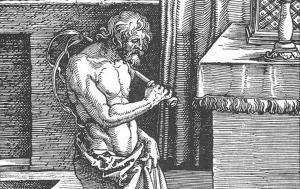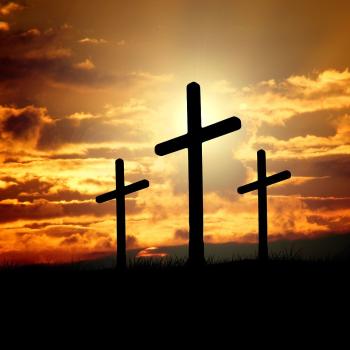
In this, final instalment of the series, I’ll be looking at the fifth point of Calvinism, Perseverance of the Saints, and explaining why I think any of this matters. But first, a comment on my approach:
A reader commented on part four of this series, observing (without criticism) that I do not quote Calvin or Calvinists in any of these posts. There are good reasons for that. First of all, Calvin himself did not define the TUPIL mnemonic. Distilling his theology from Institutes of the Christian Religion is a mammoth task; so mammoth, that the Synod of Dort was convened, 1618-1619, where Calvin’s ideas were debated at length to resolve a dispute between the followers of Arminius, who opposed some of Calvin’s ideas, and others who held to the Belgic Confession (which wasn’t written by Calvin but followed his doctrines). Are you losing the will to live, yet?
This gathering of religious leaders, formally titled The Decision of the Synod of Dort on the Five Main Points of Doctrine in Dispute in the Netherlands, rendered an official judgement that Calvinism was right and Arminianism (which insisted on free will) was wrong, and it was in the synod’s publications that the TULIP mnemonic was crystallised.
TULIP would perhaps have remained an obscure, theological definition, if not for its popularisation in a well-read pamphlet, published in 1963.
So you see, we’re dealing with writings from an array of people, who lived in different eras of church history, summarising the writings of Calvin. There is little hope of capturing every nuance of Reformed thought in a short article, and little point quoting any of these folk, because when you boil Calvinism down, TULIP sums it up pretty well. TULIP is the simplistic, modern version of Calvinism that many believers hold to today, taught in churches (directly or indirectly) the world over. Therefore, to make a clear, impactful argument, I must address TULIP itself, rather than wade through historic documents for quotable snippets. And now I’ve wasted 300 words…
I mentioned in a previous post that all five points of Calvinism rely on the others for support. Calvinism is circular thinking, and each point of the mnemonic props up the others, or the whole thing comes tumbling down. Perseverance of the Saints only exists to answer a question that Calvinist thought begs – if election is unconditional, and grace irresistible, what about people who ‘fall away’ from faith? Did grace fail, in their case?
Perseverance of the Saints argues that those people were never believers in the first place. It states that only those who hold to faith their entire life are truly ‘elect’. In the previous posts, I’ve made it clear that four points of TULIP only exist to provide answers, albeit unsatisfactory ones, to the questions that arise from the central point – Total Depravity.
The heart of Calvinist teaching is that we are corrupted in every part, and any good to be found in us is imputed through the sacrifice of Jesus. Calvin believed that it is impossible for base creatures such as ourselves to respond to God. The other four points follow naturally enough:
If we are incapable of responding positively to God, then God must be responsible for the choice we make to follow him (Unconditional Election). This makes free will an illusion, as we have no resistance to grace (Irresistible Grace). In holding to this, Calvinists must then explain how anyone resists God, in a world populated by people of other faiths and of none. Their answer – Limited Atonement. According to Calvinists, God has only chosen a few for salvation, and everyone else is destined for destruction.
It gets worse. According to Perseverance of the Saints, nobody gets to choose the kind of life they live either, because God wills us either to salvation, including sanctification (spiritual growth) in this life, or to disobedience and destruction.
Calvinists must explain how this makes sense of the apostate. If a person responds to grace, and lives in that grace for many years before walking away from faith, Calvinists have to justify that this is not a failure of the grace they believe to be irresistible. And so we have Perseverance of the Saints; the ones who fall away were never Christians in the first place.
This entire system of thought/belief is self-referring, propping itself up with weak answers to questions that only need to be asked because of Calvinism’s assertions in the first place.
I hope I have displayed, in the first four instalments of this series, that it is easy to overturn these ideas when the Bible is examined more closely, and its entire counsel taken into account. And then there is the issue of fallacious logic, relying on circular thinking – a fundamental flaw that any understanding of properly constructed arguments would expose, resulting in Calvinism’s dismissal.
I want to write from the heart, for a moment. I don’t enjoy discussing this. Having been exposed to the tenets of Calvinism in my formative years, and browbeaten by its proponents as an adult, I have little tolerance for its ideas, and the impact they have on believers.
I’ve written this series for a single purpose – to help those currently imprisoned by Calvinist theology. Not diehard adherents, who in my experience are not particularly open, and treat any discussion of their creed in a pseudo-legal manner, rather than as a matter of faith. These posts are for the ordinary, churchgoing believer, who is exposed to these ideas as fundamentally Christian, when they are not. Total Depravity in particular, has a stranglehold in the Body of Christ.
I remember a prayer meeting, in which a Calvinist chap took the mic and shared a story about his four-year-old daughter. After making a reference to herself as a Christian, her father had told her she was not, in fact, a believer. He insisted she was yet to be convicted of her sin, her total depravity, as per his belief. He told the story as if he’d honoured God, and was lauded for it by the congregation, while I sat in shocked disbelief, wondering how anyone could be so cruel to their own child. He finished his story by telling us ‘she’s been very quiet ever since,’ as if that was evidence of the Holy Spirit, convicting her. Twenty-five years later, recalling this still grieves my heart.
I think about a congregation I used to attend, and the difference between worship leaders. There was one chap, whose obsession with human depravity dragged him down again and again. We might be singing a joyful song of salvation, but then the gears would shift and we’re loathing ourselves as a sacrament. Calvinists wilfully focus on their own unworthiness, rather than the worthiness of Christ, and this changes who they are, robbing them of joy, lightness of spirit, and confidence.
At university, I knew two friends who greeted each other as ‘dirty rotten sinner’, to keep other humble. Perhaps they were worried about Perseverance of the Saints, and why shouldn’t they be? According to Calvinism, they will not know until the last day of their life if they will hold to faith, so they must believe in the possibility that they are not among ‘the elect’ – an itch that can never be scratched, a fear that can never be assuaged. The whiff of sulphur is forever in every Calvinist’s nostrils.
It is hard to have any kind of healthy self-esteem (what psychologists call positive self-regard) if you believe you might be an object of wrath, destined for destruction. The true Calvinist devotee must hold to that belief, or they are not Calvinists at all. How would that affect drawing near and worshipping God? It cannot be a help, and cannot encourage intimacy, or more importantly, trust.
Adult believers can tie themselves in theological knots, and think they are content with the shape of their faith, but when we approach God, we do so as children. When we pray in faith, it is with a child’s trust. When we receive his love, it is with a child’s abandonment. None if this is possible if God is remote, stern, and toying with his creation.
At the end of the day, Calvinists believe that God not only has the right to do what he wants, but that he exercises that right by destining the vast majority of humans who have ever lived to burn in Hell, forever. That image of God is cruel, uncaring, and despotic.
If that is the nature of God, he is a tyrant of the worst, most despicable order. If this is who God is, he is less moral than we are, less fair than we are, and less kind than we are. The creation would be above the creator in every way that matters, other than power.
Thankfully, I do not believe in this version of God, at all. Along with Calvinists, I also believe that God has the right to do what he wants, but have concluded that he exercises that will to include, rather than exclude. I believe in Jesus, and that in his kindness and compassion, and in his willingness to heal and to forgive, he displayed the full nature of God. John 14:8-11a,
‘Philip said, ‘Lord, show us the Father and that will be enough for us.’
Jesus answered: ‘Don’t you know me, Philip, even after I have been among you such a long time? Anyone who has seen me has seen the Father. How can you say, “Show us the Father”? Don’t you believe that I am in the Father, and that the Father is in me? The words I say to you I do not speak on my own authority. Rather, it is the Father, living in me, who is doing his work. Believe me when I say that I am in the Father and the Father is in me.’
Dear reader, there are two images of God on offer. On the one hand there is the God of Calvin and his followers – stern, remote, happy to condemn you to Hell just because he can. On the other you have the gracious, compassionate love of Jesus, the true and perfect image of God, who loved the whole world so much he poured out his life for us. The Servant King and the Tyrannical Overlord are incompatible. One displays love, the other contempt; one washes our feet, the other has no regard for us at all; one puts us first, the other insists on his right to do as he wills.
It is no wonder the church is divided, when we worship two different Gods. From the bottom of my heart, I urge every reader to choose Jesus. The day I abandoned heavy, condemning theology was the day my relationship with God took off. I spread my wings and found I could fly. This can be your experience too, should you choose it. You don’t need to believe this stuff anymore. You can move on and up, and know Love.












